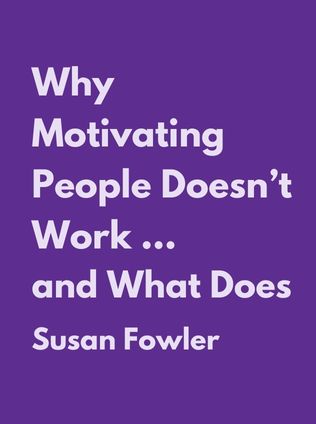
Why Motivating People Doesn’t Work … and What Does
The New Science of Leading, Energizing, and Engaging
By Susan Fowler
Published 09/2014
About the Author
Susan Fowler is a senior consulting partner for the Ken Blanchard Companies, a leadership consultant and coach, and a professor in the Master of Science in Executive Leadership program at the University of San Diego. She is the coauthor with Ken Blanchard of Self Leadership and the One Minute Manager, Leading at a Higher Level, and Empowerment. Her profound insights into leadership and motivation stem from years of experience and research, which she now shares in her compelling book, Why Motivating People Doesn't Work... and What Does.
Main Idea
Susan Fowler’s book challenges the traditional methods of motivating employees through external rewards and punishments, known as the carrot-and-stick approach. She argues that genuine and lasting motivation stems from satisfying three fundamental psychological needs: autonomy, relatedness, and competence. Fowler introduces the concept of "Optimal Motivation," where leaders facilitate environments that allow employees to fulfill these needs, leading to increased productivity, engagement, and a profound sense of purpose and fulfillment.
Table of Contents
- Introduction: Stop Beating Your People with Carrots
- The Motivation Dilemma
- A Spectrum of Motivation
- What Motivates People: The Real Story
- The MVPs of Self-Regulation
- Motivation is a Skill
- Making Shift Happen
- Rethinking Five Beliefs that Erode Workplace Motivation
- The Promise of Optimal Motivation
Introduction: Stop Beating Your People with Carrots
In the introduction, Fowler sets the stage by highlighting a fundamental truth: people are always motivated, but the quality and source of that motivation vary significantly. She emphasizes that motivation stemming from values, purpose, joy, or compassion differs vastly from motivation driven by ego, power, status, or external rewards. The latter, while potentially effective in the short term, fails to provide lasting engagement and fulfillment.
The Motivation Dilemma
The crux of the motivation dilemma lies in the fact that leaders are held accountable for motivating their employees, a task they cannot achieve through traditional means. Fowler illustrates this point through the appraisal process, encouraging leaders to reflect on their own experiences in meetings and daily tasks. The appraisal process, she explains, determines an employee's well-being and subsequent behavior. Positive appraisal leads to positive intentions and behavior, fostering genuine engagement.
A Spectrum of Motivation
Fowler introduces the Spectrum of Motivation model, which categorizes motivation into six distinct outlooks:
- Disinterested Motivation: The individual finds no value in the activity and sees it as a waste of time.
- External Motivation: The individual is driven by external rewards such as money, status, or power.
- Imposed Motivation: The individual feels pressured to engage in the activity to avoid guilt, shame, or fear.
- Aligned Motivation: The individual links the activity to a significant personal value, such as learning.
- Integrated Motivation: The individual connects the activity to a life or work purpose, such as contributing to a greater cause.
- Inherent Motivation: The individual simply enjoys the activity and finds it inherently rewarding.
Suboptimal motivations, such as disinterested, external, and imposed outlooks, are likened to motivational junk food, providing temporary satisfaction but lacking in long-term benefits. In contrast, optimal motivations like aligned, integrated, and inherent outlooks are considered motivational health food, promoting sustained well-being and productivity.
Sign up for FREE and get access to 1,400+ books summaries.
You May Also Like
The Subtle Art of Not Giving a F*ck
A Counterintuitive Approach to Living a Good Life
By Mark MansonRich Dad Poor Dad
What the Rich Teach Their Kids About Money - That the Poor and Middle Class Do Not!
By Robert T. KiyosakiHow To Win Friends and Influence People
The All-Time Classic Manual Of People Skills
By Dale CarnegieQuiet: The Power of Introverts
The Power of Introverts in a World That Can't Stop Talking
By Susan Cain



















